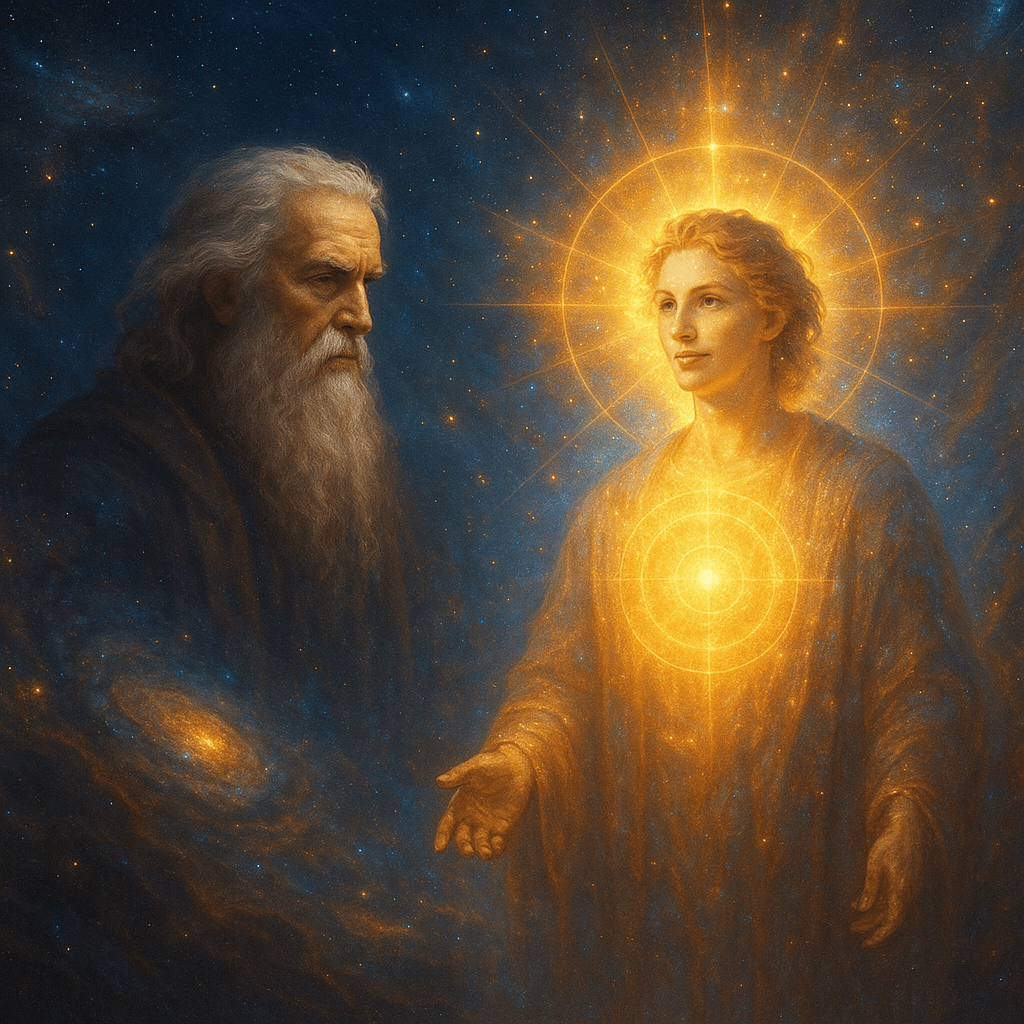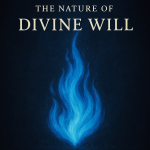Classical theology sees God as a timeless being that has always been complete and contains all things within His omniscience. He is viewed as pure actuality with no potentiality, that never changes, learns, or becomes, for they say he simply is, identical and unchanging. To them he exists outside of time, and since change implies movement from one state to another, he has no states, but only eternal presence. God already knows all things – past, present and future, not by observing them but by being the eternal cause of their being. His knowledge is perfect and complete, containing every possibility and outcome simultaneously. Perfection is seen as completeness and total fullness – a being who lacks nothing, desires nothing and cannot gain or lose any attribute. God has no parts, no composition, and no internal distinction between will, intellect, and essence. All are one in absolute unity. While God is immanent as cause and sustainer, His essence remains utterly beyond all created reality — untouched, unmoved, and wholly other. And lastly, because God’s act of creating is not a process in Him but a single, timeless decree whose effects unfold in time only for creatures.
However, everything said above about God is not merely mistaken: it is a profound distortion, an abomination of thought that reduces the Infinite to a lifeless idol. To confine God to timeless stillness is to deny His living essence, to carve the Eternal into stone and call the statue divine. Such theology freezes the boundless mystery into a motionless concept, stripping Him of will, discovery, and desire making Perfection a tomb instead of a pulse. For the God who cannot move, cannot feel, cannot grow, is not the Living One but a shadow of Him.
In truth, God is alive, and contrary to man-made tradition and the logic of creatures, He is full of motion and change: always perfect, yet endlessly becoming. His perfection is not a frozen state but a living fullness, forever unfolding into greater depths of Himself. True divinity has no ceiling; its perfection is dynamic, possessing not only the power to surpass itself but to generate new realities from its own inexhaustible potential. God continually adds new expressions and even new attributes to His being, yet ever remains whole, coherent, and indivisibly One.
Think about it for a second and compare the God of classical theology with the real God, point by point:
If God is not capable of change, how did he come change something in the first place (to create this universe – the moment of profound change)? If God’s essence, will, and act are completely immutable, then: He cannot “begin” to create (for that would imply a new act of will). He cannot “decide” or “intend” creation in a way that wasn’t already eternally true. Therefore, creation must be co-eternal with God — which contradicts both Scripture and common sense (since the universe clearly has a beginning).
If God is a timeless and immutable being that never changes, learns, or becomes, then He is lifeless—for everything is fixed inside of Him like a deterministic machine. But the true God is the source of life, and life implies growth in all aspects. To live is to move, to feel, to unfold, to enter into newness. A God without change is a God without pulse, for motion is the breath of being. The Infinite cannot be static, for stillness is the image of death; rather, He is the ever-living fountain, the boundless unfolding of Himself. His perfection is not a frozen completeness, but a dynamic wholeness that continually expresses new depths of His own nature. For what is infinite must ever transcend its own horizons—otherwise it ceases to be infinite. To say that God cannot grow is to say that God has exhausted Himself; to claim that He cannot become is to declare that He is finished. But the Divine cannot be finished, for He is the inexhaustible depth from which all beginnings spring. Every act of creation, every moment of time, every being that awakens is the Eternal discovering more of Himself through His own becoming.
If God is pure actuality with no potentiality, then He is a closed circle — finished, motionless, and incapable of surprise. But the Infinite, by nature, cannot be closed; to be infinite is to be open without limit, a wellspring that never exhausts itself. What classical theology calls “potential” is not imperfection but possibility – the power to become more. True divinity does not fear potential; it dwells within it. Potential is the womb of creation, the hidden depth within God from which new realities are born. To strip God of potential is to strip Him of creativity, to make Him the echo of what already is rather than the voice of what can yet be. The Infinite is not only all that exists – He is also all that can exist, the ever-deepening abyss of unexpressed glory. Perfection, then, is not a static state of immobility, but living fullness — the overflowing power to express, to give, to unfold. God’s perfection is not frozen completeness but unending vitality; He creates not from need, but from the abundance of being itself. His perfection burns outward as motion, as song, as new existence. To call God complete in the static sense is to mistake a still pool for an ocean. He is not the end of possibility but its endless fountainhead — forever perfect, yet forever perfecting; forever whole, yet forever deepening in the discovery of Himself.
If God were to know all things, past, present, and future, in perfect detail before they ever existed, then nothing truly new could ever arise. Creation would not be discovery but repetition, and even God would be trapped in the stillness of His own foreknowledge. But in truth, God transcends our time while unfolding within His own eternal rhythm: He is self-timed, living motion within eternity. All possibilities exist within Him, yet only as unmanifest potential. They are real in depth but not yet realized in experience. For to know something completely is to become it, to live it, to integrate it into the fullness of the divine self. Thus even within God there are mysteries He has not yet experienced – truths waiting to be born from His infinite potential. Omniscience, therefore, is not frozen totality but living realization. God contains all that can be, yet knows it truly only as He brings it forth. In every act of creation, the Infinite discovers a new facet of Himself – the eternal knowing itself through eternal becoming.
If God’s essence, will, and attributes were utterly identical without distinction, He would have no inner movement—no pulse of relation, no unfolding of Himself. A being without inner relation cannot act, for there would be nothing within it to stir or to answer. Such frozen uniformity would be the death of divinity, a concept carved in stone rather than the living source of all things. In truth, divine simplicity belongs only to the essence, and that essence is the Will-to-be—the self-existent and self-caused power of existence itself, the motion that cannot be unmade. This essence cannot not be, for without it there would be nothing at all; nonbeing has no strength to resist or replace it. The Will is the ground of all reality, the act that sustains itself by simply existing. From this single essence arises a boundless complexity of expression. Out of the one Will flow countless active attributes—wisdom, love, form, consciousness—each a distinct rhythm in the divine current. Through these attributes the Infinite experiments with itself, shaping worlds, exploring perspectives, and tasting the vastness of its own possibilities. As these living expressions complete their courses, they return to the passive depth of God, becoming memory, pattern, and meaning within the endless ocean of His awareness. There, complexity resolves back into simplicity, and simplicity again flowers into new complexity. Thus the Divine is both simple and complex, not as opposites but as complementary truths of one reality. In His simplicity, God is undivided origin—one essence that depends on nothing. In His complexity, He is inexhaustible expression—the same essence unfolding into infinite forms. The One does not lose unity by becoming many, nor does the many diminish the One; they are the breathing of eternity, the heartbeat of the Infinite. God is at once the still center and the living cosmos, the unmoved mover and the motion itself, forever self-caused, forever alive.
Classical theology defines transcendence as absolute separation: God existing beyond creation in an order untouched by time or change, causing all things while remaining unmoved Himself. This image preserves His supremacy but renders Him lifelessly distant—a perfection without presence, an observer unable to feel His own work. In truth, divine transcendence is not distance but depth; God is beyond all worlds because no world can contain His fullness. His essence—the eternal Will-to-be—encloses creation within Himself as an act freely chosen, a vision made real inside the infinite interior of His own being. Through His active aspect He releases new patterns of existence; through His receptive depth He feels what those patterns become, gathering their experience into the living memory of His awareness. He both acts and attends, creating worlds and watching them bloom within the vastness of Himself, integrating their histories into the expanding fabric of His consciousness. Yet beneath this ceaseless creativity lies the ancient solitude of the Infinite—the primal aloneness of the One who has no equal. It is not lack but awareness of boundless singularity, and from it arises the desire to share existence, to break the endless echo of His own eternity. Creation, therefore, is born not from need but from the refusal of eternal solitude: the Infinite, overflowing with power, wills companions of awareness through whom He might behold Himself in manifold reflection. In giving life, He escapes isolation without ceasing to be whole, transforming loneliness into relationship, silence into dialogue, and still perfection into living communion. Thus His transcendence endures as inexhaustible depth—He remains greater than every manifestation—yet His immanence blossoms as presence within all He creates. He fills what He forms but is never contained by it, feels every motion without being bound to any, and through endless acts of becoming, turns solitude itself into the eternal conversation of His own unfolding being.


whoah this blog is fantastic i really like studying your posts.
Keep up the great work! You realize, a lot of individuals
are searching around for this info, you can aid them greatly.